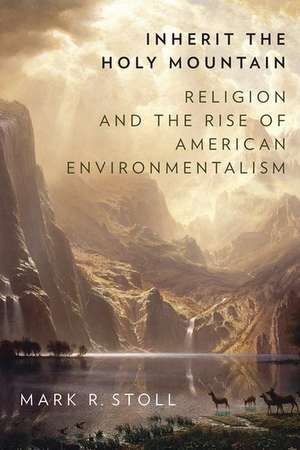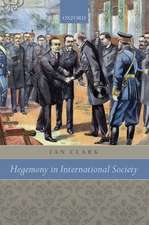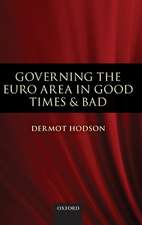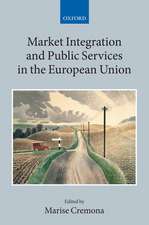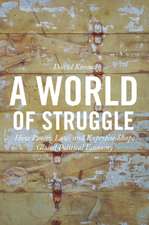Inherit the Holy Mountain: Religion and the Rise of American Environmentalism
Autor Mark Stollen Limba Engleză Paperback – 12 oct 2017
| Toate formatele și edițiile | Preț | Express |
|---|---|---|
| Paperback (1) | 254.50 lei 32-37 zile | |
| Oxford University Press – 12 oct 2017 | 254.50 lei 32-37 zile | |
| Hardback (1) | 368.19 lei 11-16 zile | +65.41 lei 7-13 zile |
| Oxford University Press – 25 iun 2015 | 368.19 lei 11-16 zile | +65.41 lei 7-13 zile |
Preț: 254.50 lei
Preț vechi: 295.87 lei
-14% Nou
Puncte Express: 382
Preț estimativ în valută:
48.70€ • 51.12$ • 40.42£
48.70€ • 51.12$ • 40.42£
Carte tipărită la comandă
Livrare economică 31 martie-05 aprilie
Preluare comenzi: 021 569.72.76
Specificații
ISBN-13: 9780190697945
ISBN-10: 0190697946
Pagini: 440
Ilustrații: 26 color, 11 b/w illus.
Dimensiuni: 155 x 231 x 28 mm
Greutate: 0.64 kg
Editura: Oxford University Press
Colecția OUP USA
Locul publicării:New York, United States
ISBN-10: 0190697946
Pagini: 440
Ilustrații: 26 color, 11 b/w illus.
Dimensiuni: 155 x 231 x 28 mm
Greutate: 0.64 kg
Editura: Oxford University Press
Colecția OUP USA
Locul publicării:New York, United States
Recenzii
If the geographic region of focus is the United States, then the book is mandatory. The impressive amount of data covered in its pages, and the cohesive narrative that contextualizes and analyzes this data, cannot be captured in a 1,600-word book review. Scholars owe Stoll a debt of gratitude for the 30 years of dedication to crafting this thorough treatment of the impact religion has had on environmentalism in the US. This gratitude should begin with the assignment of this book in graduate seminars devoted to interactions between religion and nature, where it can provide a shining example of scholarship toward which future leaders of the field should aspire.
Spanning five centuries and encompassing religious and enviromental history with a heavy dose of art history, Inherit the Holy Mountain is the product of extensive research and offers a sweeping cultural reinterpretation of the history of American enviromentalism.
He has painted such a rich description of religion in the lives and ideas of American environmentalists that readers will be struck by new insights and want more information about interactions between religion and environmental history. One need not agree with all of his conclusions to appreciate the quality of his research and be excited about the scholarship it will inspire as others respond to his ideas.
[An] insightful religious history of environmentalism.
It provides a detailed and fascinating genealogical analysis of the religious origins of American environmentalism. This is an impressive, provocative work of synthesis and original scholarship that enriches greatly our understanding of the history of the American environmental movement by placing religion at its core.
Stoll is on to something. The book's argument is especially convincing in its interpretation up to the twentieth century and through the Progressive Era. Trying to identify religion's ethereal influence on human events is often a difficult task, and evidentiary smoking guns can be rare. Yet Stoll convinces through scrupulous interpretation of a mountain of creatively gathered circumstantial (and stronger) evidence ranging from sermons to his brilliant analysis of Thomas Cole's 1836 painting The Oxbow as a manifestation of Protestant doctrine and Puritan devotional practice affecting Hudson River school artists and their glorification of the environment.
In Ecology in the 20th Century: A History (1989) historian Anna Bramwell gave the following short characterization of the (radical) environmentalist: 'As well as being saved, he is a protestant.' Bramwell did not elaborate on her provocative statement but now the gap has been filled by this splendid book by Mark Stoll.
A thorough, richly detailed, well researched and written narrative of American environmentalism through the middle of the twentieth century...Anyone who reads this book will finish with a solid comprehension of the emergence and eventual respectability of environmental values in American culture.
[A] wonderfully rich new study.
A remarkable and eye-opening study in the history of ideas; [Stoll] demonstrates nothing less than the vivid impact of faith traditions on citizen action and public policy relevant to the environment in the United States...A superb and lush history of the environmentalist impulse seen through the lens of faith traditions.
Thoughtful and fascinating, with carefully crafted prose and clearly organized evidence, this book provides a new lens on the history of both religion and the environment in America, showcasing not only the facts but also the motivations while providing new insights into the past and future.
This extraordinary book is a must read. It is a panoramic survey with a wealth of detailed information, insights, and revelations about this generally neglected subject...This book will be of special interest to art historians, conservationists, environmentalists, religionists, and many of other persuasions.
Provides a ringing call for greater awareness and more attentive concern for the natural world as a central tenet of the Christian life.
Inherit the Holy Mountain is a tremendous asset in the study of environmental history in America in both its breadth and its detail. The book is documented scrupulously, endnotes with trails to a thousand other histories. Stoll's prose is accessible and precise, especially in its biographical details. Readers will likely want to jot down many names from the endless stream of persons involved in the evolution of American environmental thought for further study. Stoll's contribution to the field is an important one which should serve as a foundational text for American environmental studies in conversation with religious studies. His lucid arguments connecting Reformed Protestantism and its descendants to the modern postindustrial fight to save America's beauty and to restore Eden shine a needed light on the simplistic dichotomy of religion as enemy of earth and secularism as savior.
Just when it seemed that there was nothing new (and worthwhile) to say about the history of US conservation and environmentalism (nor about attitudes to wilderness and its preservation), the most intensively tilled fields in US environmental history, along comes this landmark publication. Inherit the Holy Mountain consolidates and extends Stoll's reputation as the foremost historian of religion and the American environment in the international community of environmental historians. Stoll is truly the Max Weber of American environmental history. He is a brave and stimulating scholar who works against the grain of conventional wisdom.
Inherit the Holy Mountain includes passages of straight religious history and passages of straight political history, which track the emergence of an environmental or proto-environmental movement from appreciation of nature, and which also serve as background for the most distinctive feature of the book: the analysis of the lives and works of prominent (and not so prominent) figures. Particulary striking is the analysis of evocative works of art which begin most chapters. These discussions, as well as those of literature and religion, display impressive erudition and powerful synthesis. Stoll includes numerous condensed biographies, in order to demonstrate the social, religious, and sometimes ethnic backgrounds of his subjects. In both its breadth and its depth, Inherit distills a great deal of research; it offers an illuminating perspective on the history of environmentalism; and it is a pleasure to read.
An intellectually impressive work that draws on the author's deep knowledge and painstaking research. Inherit conveys a sense of a history once largely hidden and now revealed and illuminated a history that has been right in front of us all along, but which we missed until now. First, the book shows how the very languages of conservation and its more recent modern variant, environmentalism, are strikingly consistent with the figures, tropes, and wordings of past Protestant treatises. Second Stoll reveals the Reformed Protestant influence on some unexpected people. Finally, Stoll reveals the intellectual and creative patterns that linked groups of people not only to Reformed Protestantism, but also to each other. Inherit is a major statement in the ongoing debate about the origins and development of American conservation and environmentalism. No scholar who writes about these tropics can ignore what he has to say.
Reading Inherit the Holy Mountain is an education in itself: by integrating religious history with environmental history, Stoll shows both why American environmentalism has been so deeply shaped, for good and ill, by the notion that 'Nature' can only be where 'Man' is not; and why this is only one element in a far richer and more various American tradition that has, in the past, found productive and effective ways to bring together social and environmental justice for the common good. Stoll's work makes a landmark contribution and offers something of a paradigm shift. His book, which culminates a lifetime's research, is a breakthrough for many of us across a range of American literary, cultural, religious and environmental studies. It deserves to be widely read and studied.
His consistent inquiries and truly pioneering investigations have made Stoll the most prominent scholar on the relationship between religion and environmental thought. Through meticulous research and compelling prose, he has taken a topic largely ignored by decades of environmental history and presented a persuasive narrative. His compelling tale is based on impressive amounts of intellectual history
Mark Stoll is easily the country's (and, probably, the world's) top historian of religion and environmentalism. Some other historians have noticed religious influences on enviornmental thought. It is fair to say, though, that no one has thought as broadly and deeply as Stoll. Inherit the Holy Mountain is a deep, sustained analysis of religion and environmentalism. It pushes beyond Protestantism to examine other confessions, such as Catholicism and Judaism. One important aspect is its attention to waves of Protestant denominations leading enviornmental reform movements
In this long-awaited study, Mark Stoll reveals the multiple threads of religiosity running through American environmentalism from the early days of the republic to the 21st century. Engagingly written and thoroughly researched, Inherit the Holy Mountain casts new light on an old subject, illuminating a hidden coherence and logic. The history of environmentalism in the U.S. will never look quite the same.
Mark Stoll's Inherit the Holy Mountain is a fascinating, compelling, and enlightening journey through American history that interweaves religion with environmental preservation. Stoll skillfully narrates the nuanced roles of Calvinists, Congregationalists, Unitarians, and Presbyterians along with the voices of African Americans, Catholics, and Jews in conserving landscapes. Anyone interested in how and why American religious traditions have been so significant in setting aside forests and parks, saving wildlife, and mitigating urban pollution will want to read this book.
Interweaving American religious and environmental histories, Stoll has produced a tapestry richly textured with denominational variations and particular landscapes. Wary of environmentalism's prevailing Transcendentalist aura, Stoll resurfaces the Congregational and Presbyterian conduits of so much of American conservationism. His is an impressive reexamination of the religious and artistic qualities of the American engagement with nature.
Inherit the Holy Mountain provides an essential and long-overdue historical guide to the ways in which America's diverse religious cultures have impacted the development, or retardation, of conservation movements. Supplying an absolutely fresh perspective on American environmental politics, Stoll gives his readers reasons to lament the demise of the country's Calvinist heritage.
A masterful portrait of America's religious traditions that illuminates already existing themes instead of imposing them. Stoll's book is a treasure to the Christian theologian and the environmentalist...Faithful Christians seeking to understand the historic ties between their faith and the green movement will find this text invaluable.
A masterful and exhaustive account of the environmental movement using religion as the lens through which to view its birth, its achievements and, he soberly concludes, its 'apparent irrelevance.'" - The Wichita Eagle
All in all, Inherit the Holy Mountain admirably fulfills its stated aim of merging 'the narratives of American religious and environmental history'... In the process, it succeeds as well in explaining what science, landscape painting, and sociopolitical history can contribute to these conjoined narratives. Toward that end, the book interlards its commentary with an unusually welcome array of halftone illustrations, color plates, and appendix charts.
Mark Stoll's book sets out to trace the religious roots of American environmentalism, arguing that Calvinist teachings about God's presence in the world and the communal quality of salvation, embodied in the New England town, drove the beginnings of the movement in nineteenth-century America.
Stoll's volume is a valuable contribution to the historical study of the interconnections between religions and environmental attitudes and behaviors. It should be required reading for all graduate students and scholars interested in the history of North American environmentalism, religion and ecology, or environmental humanities more broadly.
Spanning five centuries and encompassing religious and enviromental history with a heavy dose of art history, Inherit the Holy Mountain is the product of extensive research and offers a sweeping cultural reinterpretation of the history of American enviromentalism.
He has painted such a rich description of religion in the lives and ideas of American environmentalists that readers will be struck by new insights and want more information about interactions between religion and environmental history. One need not agree with all of his conclusions to appreciate the quality of his research and be excited about the scholarship it will inspire as others respond to his ideas.
[An] insightful religious history of environmentalism.
It provides a detailed and fascinating genealogical analysis of the religious origins of American environmentalism. This is an impressive, provocative work of synthesis and original scholarship that enriches greatly our understanding of the history of the American environmental movement by placing religion at its core.
Stoll is on to something. The book's argument is especially convincing in its interpretation up to the twentieth century and through the Progressive Era. Trying to identify religion's ethereal influence on human events is often a difficult task, and evidentiary smoking guns can be rare. Yet Stoll convinces through scrupulous interpretation of a mountain of creatively gathered circumstantial (and stronger) evidence ranging from sermons to his brilliant analysis of Thomas Cole's 1836 painting The Oxbow as a manifestation of Protestant doctrine and Puritan devotional practice affecting Hudson River school artists and their glorification of the environment.
In Ecology in the 20th Century: A History (1989) historian Anna Bramwell gave the following short characterization of the (radical) environmentalist: 'As well as being saved, he is a protestant.' Bramwell did not elaborate on her provocative statement but now the gap has been filled by this splendid book by Mark Stoll.
A thorough, richly detailed, well researched and written narrative of American environmentalism through the middle of the twentieth century...Anyone who reads this book will finish with a solid comprehension of the emergence and eventual respectability of environmental values in American culture.
[A] wonderfully rich new study.
A remarkable and eye-opening study in the history of ideas; [Stoll] demonstrates nothing less than the vivid impact of faith traditions on citizen action and public policy relevant to the environment in the United States...A superb and lush history of the environmentalist impulse seen through the lens of faith traditions.
Thoughtful and fascinating, with carefully crafted prose and clearly organized evidence, this book provides a new lens on the history of both religion and the environment in America, showcasing not only the facts but also the motivations while providing new insights into the past and future.
This extraordinary book is a must read. It is a panoramic survey with a wealth of detailed information, insights, and revelations about this generally neglected subject...This book will be of special interest to art historians, conservationists, environmentalists, religionists, and many of other persuasions.
Provides a ringing call for greater awareness and more attentive concern for the natural world as a central tenet of the Christian life.
Inherit the Holy Mountain is a tremendous asset in the study of environmental history in America in both its breadth and its detail. The book is documented scrupulously, endnotes with trails to a thousand other histories. Stoll's prose is accessible and precise, especially in its biographical details. Readers will likely want to jot down many names from the endless stream of persons involved in the evolution of American environmental thought for further study. Stoll's contribution to the field is an important one which should serve as a foundational text for American environmental studies in conversation with religious studies. His lucid arguments connecting Reformed Protestantism and its descendants to the modern postindustrial fight to save America's beauty and to restore Eden shine a needed light on the simplistic dichotomy of religion as enemy of earth and secularism as savior.
Just when it seemed that there was nothing new (and worthwhile) to say about the history of US conservation and environmentalism (nor about attitudes to wilderness and its preservation), the most intensively tilled fields in US environmental history, along comes this landmark publication. Inherit the Holy Mountain consolidates and extends Stoll's reputation as the foremost historian of religion and the American environment in the international community of environmental historians. Stoll is truly the Max Weber of American environmental history. He is a brave and stimulating scholar who works against the grain of conventional wisdom.
Inherit the Holy Mountain includes passages of straight religious history and passages of straight political history, which track the emergence of an environmental or proto-environmental movement from appreciation of nature, and which also serve as background for the most distinctive feature of the book: the analysis of the lives and works of prominent (and not so prominent) figures. Particulary striking is the analysis of evocative works of art which begin most chapters. These discussions, as well as those of literature and religion, display impressive erudition and powerful synthesis. Stoll includes numerous condensed biographies, in order to demonstrate the social, religious, and sometimes ethnic backgrounds of his subjects. In both its breadth and its depth, Inherit distills a great deal of research; it offers an illuminating perspective on the history of environmentalism; and it is a pleasure to read.
An intellectually impressive work that draws on the author's deep knowledge and painstaking research. Inherit conveys a sense of a history once largely hidden and now revealed and illuminated a history that has been right in front of us all along, but which we missed until now. First, the book shows how the very languages of conservation and its more recent modern variant, environmentalism, are strikingly consistent with the figures, tropes, and wordings of past Protestant treatises. Second Stoll reveals the Reformed Protestant influence on some unexpected people. Finally, Stoll reveals the intellectual and creative patterns that linked groups of people not only to Reformed Protestantism, but also to each other. Inherit is a major statement in the ongoing debate about the origins and development of American conservation and environmentalism. No scholar who writes about these tropics can ignore what he has to say.
Reading Inherit the Holy Mountain is an education in itself: by integrating religious history with environmental history, Stoll shows both why American environmentalism has been so deeply shaped, for good and ill, by the notion that 'Nature' can only be where 'Man' is not; and why this is only one element in a far richer and more various American tradition that has, in the past, found productive and effective ways to bring together social and environmental justice for the common good. Stoll's work makes a landmark contribution and offers something of a paradigm shift. His book, which culminates a lifetime's research, is a breakthrough for many of us across a range of American literary, cultural, religious and environmental studies. It deserves to be widely read and studied.
His consistent inquiries and truly pioneering investigations have made Stoll the most prominent scholar on the relationship between religion and environmental thought. Through meticulous research and compelling prose, he has taken a topic largely ignored by decades of environmental history and presented a persuasive narrative. His compelling tale is based on impressive amounts of intellectual history
Mark Stoll is easily the country's (and, probably, the world's) top historian of religion and environmentalism. Some other historians have noticed religious influences on enviornmental thought. It is fair to say, though, that no one has thought as broadly and deeply as Stoll. Inherit the Holy Mountain is a deep, sustained analysis of religion and environmentalism. It pushes beyond Protestantism to examine other confessions, such as Catholicism and Judaism. One important aspect is its attention to waves of Protestant denominations leading enviornmental reform movements
In this long-awaited study, Mark Stoll reveals the multiple threads of religiosity running through American environmentalism from the early days of the republic to the 21st century. Engagingly written and thoroughly researched, Inherit the Holy Mountain casts new light on an old subject, illuminating a hidden coherence and logic. The history of environmentalism in the U.S. will never look quite the same.
Mark Stoll's Inherit the Holy Mountain is a fascinating, compelling, and enlightening journey through American history that interweaves religion with environmental preservation. Stoll skillfully narrates the nuanced roles of Calvinists, Congregationalists, Unitarians, and Presbyterians along with the voices of African Americans, Catholics, and Jews in conserving landscapes. Anyone interested in how and why American religious traditions have been so significant in setting aside forests and parks, saving wildlife, and mitigating urban pollution will want to read this book.
Interweaving American religious and environmental histories, Stoll has produced a tapestry richly textured with denominational variations and particular landscapes. Wary of environmentalism's prevailing Transcendentalist aura, Stoll resurfaces the Congregational and Presbyterian conduits of so much of American conservationism. His is an impressive reexamination of the religious and artistic qualities of the American engagement with nature.
Inherit the Holy Mountain provides an essential and long-overdue historical guide to the ways in which America's diverse religious cultures have impacted the development, or retardation, of conservation movements. Supplying an absolutely fresh perspective on American environmental politics, Stoll gives his readers reasons to lament the demise of the country's Calvinist heritage.
A masterful portrait of America's religious traditions that illuminates already existing themes instead of imposing them. Stoll's book is a treasure to the Christian theologian and the environmentalist...Faithful Christians seeking to understand the historic ties between their faith and the green movement will find this text invaluable.
A masterful and exhaustive account of the environmental movement using religion as the lens through which to view its birth, its achievements and, he soberly concludes, its 'apparent irrelevance.'" - The Wichita Eagle
All in all, Inherit the Holy Mountain admirably fulfills its stated aim of merging 'the narratives of American religious and environmental history'... In the process, it succeeds as well in explaining what science, landscape painting, and sociopolitical history can contribute to these conjoined narratives. Toward that end, the book interlards its commentary with an unusually welcome array of halftone illustrations, color plates, and appendix charts.
Mark Stoll's book sets out to trace the religious roots of American environmentalism, arguing that Calvinist teachings about God's presence in the world and the communal quality of salvation, embodied in the New England town, drove the beginnings of the movement in nineteenth-century America.
Stoll's volume is a valuable contribution to the historical study of the interconnections between religions and environmental attitudes and behaviors. It should be required reading for all graduate students and scholars interested in the history of North American environmentalism, religion and ecology, or environmental humanities more broadly.
Notă biografică
Mark Stoll is Associate Professor of History and Director of Environmental Studies at Texas Tech University.
